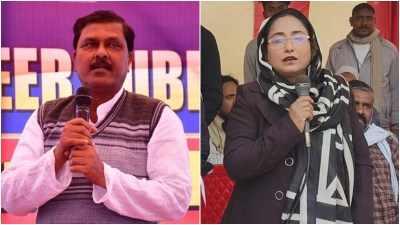Ritika Chopra, an award-winning journalist with over 17 years of experience, serves as the Chief of the National Bureau (Govt) and National Education Editor at The Indian Express in New Delhi. In her current role, she oversees the newspaper's coverage of government policies and education. Ritika closely tracks the Union Government, focusing on the politically sensitive Election Commission of India and the Education Ministry, and has authored investigative stories that have prompted government responses. Ritika joined The Indian Express in 2015. Previously, she was part of the political bureau at The Economic Times, India’s largest financial daily. Her journalism career began in Kolkata, her birthplace, with the Hindustan Times in 2006 as an intern, before moving to Delhi in 2007. Since then, she has been reporting from the capital on politics, education, social sectors, and the Election Commission of India. ... Read More
‘Embarrassed to be associated with these textbooks’: Advisors ask NCERT to drop their names from Pol Science books
Suhas Palshikar and Yogendra Yadav, who were chief advisors for the political science books for classes 9 to 12 originally published in 2006-07, have in their letter to the NCERT have said that the rationalisation exercise has mutilated the school textbooks and rendered them academically dysfunctional.
 The changes include removing all references to the 2002 Gujarat riots, reducing content related to the Mughal era and the caste system, and dropping chapters on protests and social movements. (Image credits: Twitter handle of Suhas Palshikar and Yogendra Yadav)
The changes include removing all references to the 2002 Gujarat riots, reducing content related to the Mughal era and the caste system, and dropping chapters on protests and social movements. (Image credits: Twitter handle of Suhas Palshikar and Yogendra Yadav) Objecting to the recent “innumerable and irrational cuts and large deletions” made by the National Council of Educational Research and Training (NCERT) in school textbooks, Suhas Palshikar and Yogendra Yadav, who were chief advisors for the political science books for classes 9 to 12 originally published in 2006-07, have written to the Council disassociating themselves from the textbooks in their current form and requested that their names be dropped from them.
The NCERT school textbooks are at the centre of yet another controversy with academicians and politicians criticising the sweeping changes and deletions decided last year (and implemented this year) on the pretext of reducing curriculum to help students recover from learning disruptions caused by the Covid-19 pandemic. These changes include removing all references to the 2002 Gujarat riots, reducing content related to the Mughal era and the caste system, and dropping chapters on protests and social movements.
Citing concerns over the integrity of the rationalisation process, Yadav and Palshikar, in a letter addressed to the NCERT director DS Saklani on Friday, said, “.. we fail to see any pedagogic rationale at work here. We find that the text has been mutilated beyond recognition.. without any attempt to fill the gaps thus created.”
The letter adds, “We believe that any text has an internal logic and such arbitrary cuts and deletions violate the spirit of the text. The frequent and serial deletions do not seem to have any logic except to please powers that be.”
Stating that the textbooks in their current shape do not serve the purpose of training students in political science and that they are embarrassed to have their names associated with “mutilated and academically dysfunctional” books, the Yadav and Palshikar have requested Saklani to drop their names from all political science textbooks of classes 9 to 12 in the soft copies as well as all print editions in future.
The NCERT recently defended the changes in a series of tweets, stating that the rationalization of textbooks was a “need-based exercise aimed at reducing the content load, keeping in view students’ mental health” during the pandemic. The Council clarified that the rationalised content is applicable only for the academic year 2023-24, as a new set of textbooks will be developed based on the upcoming National Curriculum Framework.



- 01
- 02
- 03
- 04
- 05





























